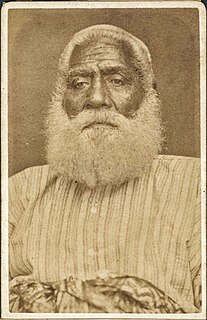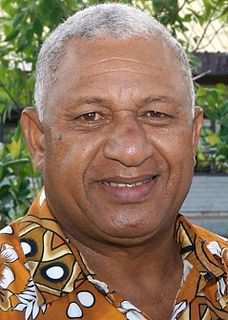
The Republic of Fiji Military Forces (RFMF) is the military force of the Pacific island nation of Fiji. With a total manpower of 3,500 active soldiers and 6,000 reservists, it is one of the smallest militaries in the world, though most of its surrounding island nations have no militaries at all. The Ground Force is organised into six infantry and one engineer battalions, with approximately 6,000 reserves. There was formerly one "Zulu" company of counter-revolutionary specialists, which was deactivated in late 2000 due to a mutiny by some of its members.

Laisenia Qarase is a Fijian political figure. He served as the sixth Prime Minister of Fiji from 2000 to 2006. After the military quashed the coup that led to the removal of Mahendra Chaudhry, Qarase joined the Interim Military Government as a financial adviser on 9 June 2000, until his appointment as Prime Minister on 4 July. He won two parliamentary elections, but a military coup removed him from power on 5 December 2006. He was later imprisoned on corruption charges brought by the Military-backed regime.

Brigadier-General Ratu Epeli Nailatikau, CF, LVO, OBE, MSD, KStJ, is a Fijian chief who was President of Fiji from 2009 to 2015. He has had a long career in the Military, diplomatic service, and government. From 2001 to 2006 he served as Speaker of the House of Representatives – the lower and more powerful chamber of the Fijian Parliament. He was also the Chairman of the Parliamentary Appropriations Committee and of the House Committee. On 8 January 2007, he was appointed the interim Minister for Foreign Affairs and External Trade; he was moved to the post of interim Minister for Provincial Development and Multi-Ethnic Affairs in September 2008. In October 2008, he became Indigenous Affairs Minister "and effectively Great Council of Chiefs chairman". On 17 April 2009, he was appointed Vice-President by the Military government.

The President of the Republic of Fiji is the Head of State of Fiji. The President is appointed by the Parliament of Fiji for a three-year term under the terms of the 2013 Constitution of Fiji. Although not entirely a figurehead, the President's role in government is mostly ceremonial, but there are important reserve powers that may be exercised in the event of a crisis. In addition, the President is Commander-in-Chief of the Military Forces.

The Great Council of Chiefs(Bose Levu Vakaturaga in Fijian, ग्रेट काउंसिल ऑफ चीफ्स in Fiji Hindi) was a constitutional body in the Republic of the Fiji Islands from 1876 to March 2012. In April 2007 the council was suspended, due to an unworkable relationship with Frank Bainimarama, leader of an "interim government" which came to power through military coup in December 2006. It was formally disestablished by decree in March 2012.

The Great Council of Chiefs(Bose Levu Vakaturaga in Fijian) was a formal assembly of Fiji's senior hereditary chiefs, along with some representatives of the national government and provincial councils, who may or may not be hereditary chiefs themselves. It also had a constitutional role in functioning as an electoral college to choose the President of the Republic, as well as 14 of the 32 Senators.

Josaia Voreqe Bainimarama CF, MSD, OStJ, known commonly as Frank Bainimarama and sometimes by the chiefly title Ratu, is a Fijian naval officer and politician who has been Prime Minister of Fiji since 2007. He was the Commander of the Fijian Military Forces from 1999 to 2014. While holding the office of Prime Minister, he has temporarily held various ministerial portfolios: Information, Home Affairs, Immigration, Public Service, Indigenous and Multi-Ethnic Affairs, Finance, and Foreign Affairs.

Ratu Seru Epenisa Cakobau was a Fijian Ratu and warlord (Vunivalu) who united part of Fiji's warring tribes under his leadership, establishing a united Fijian kingdom.
Fijians are a nation and ethnic group native to Fiji, who speak Fijian and share a common history and culture.
Ratu Naiqama Tawake Lalabalavu is a Fijian Paramount Chief and Member of Parliament. He is President of the Social Democratic Liberal Party.
Burebasaga is the largest of the three confederacies that make up Fiji's House of Chiefs, to which all Fijian chiefs belong.

Ro Teimumu Vuikaba Kepa is a Fijian chief, Member of the Parliament of Fiji, and former leader of the Social Democratic Liberal Party. She was the first Fijian woman to serve as Leader of the Opposition. She previously held the position of deputy Prime Minister in the Qarase-led Soqosoqo Duavata ni Lewenivanua (SDL) government from 2001 to 2006. As the paramount chief of the Burebasaga Confederacy, she holds the title Na Gone Marama Bale Na Roko Tui Dreketi.

The Lau Islands of Fiji are situated in the southern Pacific Ocean, just east of the Koro Sea. Of this chain of about sixty islands and islets, about thirty are inhabited. The Lau Group covers a land area of 188 square miles, and had a population of 10,683 at the most recent census in 2007. While most of the northern Lau Group are high islands of volcanic origin, those of the south are mostly carbonate low islands.

The monarchy of Fiji arose in the mid-nineteenth century when native ruler Seru Epenisa Cakobau consolidated control of the Fijian Islands and declared himself King or paramount chief of Fiji. In 1874, he voluntarily ceded sovereignty of the islands to Britain, which made Fiji a Crown colony within the British Empire. After nearly a century of British rule, Fiji became a Dominion, an independent sovereign state within the Commonwealth of Nations with Elizabeth II as head of state. After a second military coup in 1987, Fiji became a republic, and the monarchy was ended. Nevertheless, the Great Council of Chiefs recognised Elizabeth II as Tui Viti or the traditional Queen of Fiji, but the position is not one of a constitutional, or otherwise legal nature. The Great Council of Chiefs was disestablished in 2012 by decree. Elizabeth II does not use the title, and the Fijian government does not recognise it.

The Fijian coup d'état of December 2006 occurred as a continuation of the pressure which had been building since the military unrest of the 2000 Fijian coup d'état and 2005–06 Fijian political crisis.

General elections were held in Fiji on 17 September 2014, to select the 50 members of the Fijian parliament.

Ratu Josefa Iloilovatu Uluivuda, CF, MBE, MSD, KStJ as the 3rd President of Fiji from 2000 until 2009, excluding a brief period from 5 December 2006 until 4 January 2007. He held the traditional title of Tui Vuda, the paramount chief of the Vuda district in Ba Province on Fiji's northwest coast. Like many Fijian people, he rarely used his surname and was known simply as Josefa Iloilo. He announced on 28 July 2009 that he would be leaving office on 30 July. At the age of 88, he was the world's oldest head of state.











